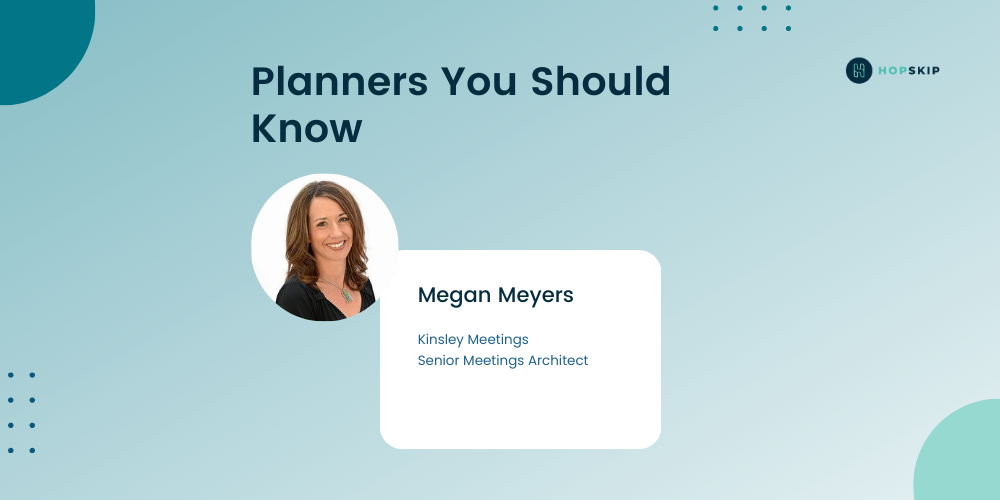Planners You Should Know - Megan Myers, Kinsley Meetings
Megan Myers, of Kinsley Meetings, discusses how she honed her skills over the pandemic to now be in position to overcome the challenges that the new meetings/events landscape brings.
Luke Whalin
Jan 30, 2023

This post is part of the HopSkip Planner Spotlight Series where HopSkip spotlights planners across the industry to bring awareness of how they adapted to COVID-19, communicating and lessons learned and sharing how they are viewing the meetings and events industry in a post-pandemic world.
Name: Megan Myers
Company Name: Kinsley Meetings
Job Title: Senior Meetings Architect
Years of Experience: 23
How did you get your start in the events industry? What made you pursue this role?
Believe it or not, a Netscape internet search is how I found my first job at a DMC here in Denver. I had just graduated from college with a marketing degree and was miserable at my current employer. I figured there MUST be a way to get paid to plan and organize events since that's what I had been doing for friends and family since I was young enough to hold a clipboard. Sure enough, my internet search for "event planning companies in Denver" yielded some results and the rest is history.
How do you compare planning your first in-person event post-pandemic, to planning meetings/events pre- Covid? What was different and unique? What was similar?
What was your number one challenge in hosting your first in-person event(s) and how did you overcome it?
The first post-pandemic, in-person meeting was definitely like riding a bike with the training wheels on again! Some things were very much the same while many of the logistics we had always taken for granted had to be thought through very differently. Masks or no masks? Are vaccines required or not? If so, how to monitor it? Food and beverage service was much more complicated with plexiglass dividers, covered water glasses, and attempts to make everything no-touch. Incorporating virtual/hybrid components for sessions definitely added expense and planning time. And of course, staffing challenges across the industry added another layer of uniqueness to the return to in-person meetings.
The decisions for how to manage health and wellness were definitely the most challenging. Rules and regulations for what was required varied greatly and those had to be balanced with what clients found most important for their attendees. Open communication with the host venues and a flexible mindset with ever-changing guidelines allowed me to find solutions that worked best for my clients.
What is the top learning that you uncovered from the last two years that you’re implementing in your planning process today? (any other tips or tricks you want to share?)
Accounting for inevitable staffing challenges has become key in my planning process over the last couple of years. Knowing that hotels and venues are often short-staffed, I work with clients to create meeting agendas that allow for more set-up time and/or budget for additional labor support. I have found that post-pandemic hotel contracts often do not leave much if any, time for move-in and move-out between groups, so some creative planning and budgeting has to happen.
Relationships, relationships, relationships! Work with people and hotel chains that you have a history with, and come to the table with reasonable requests. Don't waste your time (or the hotels') with demands you know are not realistic.
Definitely! There are many items that used to be assumed or taken for granted that we now require to be spelled out in the contracts (AV costs, internet costs, realistic move-in/move-out times between groups, etc).
We always appreciate clear communication and attention to detail with regard to our RFP. We are very specific in our requests and always appreciate when every item we have listed is addressed in some manner (even if not always agreed to).
Due to the pandemic, our events community had to evolve, adapt, and grow. Many planners started to embrace new technologies as a result of the pandemic. What new tech are you using today in your planning process as a result?
I am definitely much savvier with hybrid and virtual technologies! Though most clients are now going away from those and are focusing solely on in-person event experiences. Using comprehensive communication tools such as Teams and Zoom has helped streamline my day-to-day planning.